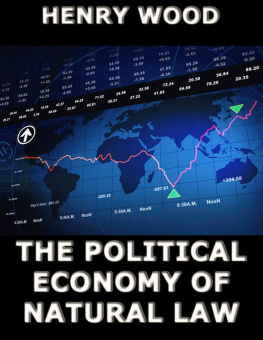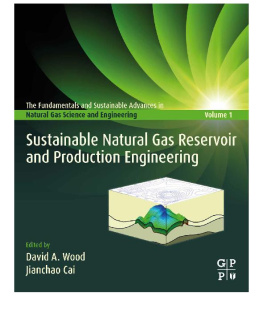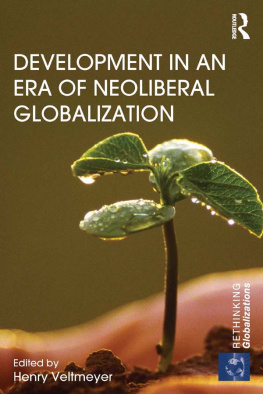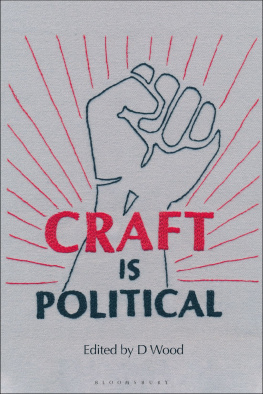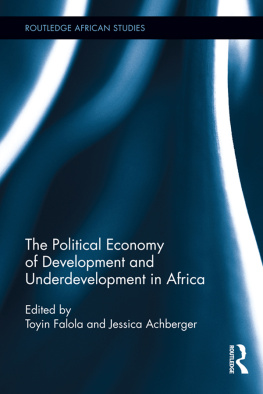The Political Economy Of Natural Law
Henry Wood
Contents:
Preface.
I. General Principles.
II. Supply And Demand.
III. The Law Of Competition.
IV. The Law Of Cooperation.
V. Labor And Production.
VI. Combinations Of Capital.
VII. Combinations Of Labor.
VIII. Employees And Profit Sharing.
IX. Employees: Their Obligations And Privileges.
X. Governmental Arbitration
XI. Economic Legislation And Its Proper Limits.
The Political Economy of Natural Law, H. Wood
Jazzybee Verlag Jrgen Beck
86450 Altenmnster, Germany
ISBN: 9783849620134
www.jazzybee-verlag.de
PREFACE.
THIS is no attempt to make people content with, things as they are, but to turn the search for improvement in a promising direction. Unrest and agitation are vastly better than stagnation, but to bring the best results they must be wisely practical and in harmony with Law.
The general purpose of this volume is the outlining of a political economy which is natural and practical, rather than artificial and theoretical. While independent of professional methods, it aims to be usefully suggestive to the popular mind. As a treatise, it is not scholastic, statistical, or historic, but rather an earnest search for inherent laws and principles.
In 1887 the author issued a small book entitled " Natural Law in the Business World," which was well received and passed through several editions. The present volume is substantially a new work, although a portion of the original matter has been retained, somewhat changed in form. If it contains any larger measure of truth, the writer will congratulate himself upon any seeming inconsistency.
The different factors of society need to be drawn together and not rent more widely apart. Negative conditions exist ; but they will not be improved by stimulating their realism, or by the assumption that they are inherent. Idealism is as wholesome in sociology as elsewhere. True sympathy for prevailing ills does not express itself in a morbid pessimism, but in pointing out the road to improvement and in inspiring hope and courage.
Conventional political economy, as professionally formulated, lacks a practical element which renders it of little utility in actual experience. Not being fitted into the nature and constitution of man, it is largely a mass of fine-spun intellectual abstraction. If the absorption of ponderous tomes of scholastic political economy does not add to one's equipment for the practical business of life, it is not easy to discover its usefulness.
The "cause of labor" has been injured by crowding under its banner many fallacies, and even more by the assumption that its interest is naturally antagonistic to that of other social elements. Society is a complex organism, or Greater Unit, and "when one member suffers, all suffer." The mischievous doctrine of a necessary diversity is largely responsible for prevailing frictions and antagonisms. The fault is not with the " social system," but with abuses which are the fruitage of moral delinquency in personal character. Labor and capital, when deeply defined, melt into each other.
The " labor problem " will never be solved by mere sentimental and professional treatment. The laborer often suffers more from the mistaken action of his professed champions than from the natural ills of his condition, and this will continue so long as he is led into a moral and economic antagonism. A deep and diligent search for causes and remedies should take the place of a mere superficial rehearsal of woes. Not only the human constitution, but the world in general, would have to be made over before the chimerical plans of professional " labor reformers" could be made operative. Artifice can never be substituted for evolution and Natural Law.
The writer will yield to no one in the intensity of his desire to promote, not only the public weal, but the interest of labor in its completeness. In whatever way superficial critics may construe detached statements of this book, the fact will remain that its deepest intent and animus is the true welfare of the workingman.
The recognition of the universality of Law is the greatest achievement and inspiration of modern times, and it is no less regnant in social economics than in physical science. Circumstances and conditions change, but the orderly sequences of Natural Law continue uniform. All improvement must come through a better interpretation of and conformity to its immutable lines.
I. GENERAL PRINCIPLES.
BEFORE entering upon any systematic study of the inherent economic laws which permeate and shape the business world as it is at present constituted, it is well to suggest that many existing limitations at some future period may be outgrown. Natural Law is never suspended or repealed by any force which can be exerted upon the same plane ; but it is axiomatic that a higher law may overcome a lower one. When we lift a weight, gravitation is not suspended, but its force is overcome by the superior law of the human will. Tree-life causes the sap to ascend, not by repealing gravity, but by surmounting it. The predominant motive of social economy, on the present plane of human development, is self-interest ; but this does not always amount to selfishness, nor does it imply that individual interests are necessarily antagonistic to each other. Normal self-interest is not only honest, but entirely compatible with philanthropy. But when, in the hoped-for golden period of the future, humanity comes into a general recognition of the higher law of unselfishness, this superior force will reach down and overcome many laws that are inherent and unrepealable on their own plane. Such an advanced condition of society is to be earnestly labored for ; but any present study of business tendencies must be made in the light of existing conditions and developments. Nationalists and communists, even though well-intentioned as the great majority undoubtedly are will never be able to galvanize unselfishness upon humanity from the outside, through governmental legislation or communistic social framework. It will only be unfolded as the natural outward expression of higher internal character.
Natural Law, as it is considered in this work, embraces in its scope the forces and tendencies which are at present operative. To hasten the evolution of higher social and economic conditions, a beginning must be made among the existent underlying antecedents which will produce them. Any inversion of this natural order will retard the coming ideal. To spend our time and energy on the outside, is only to whiten the " sepulchre." Higher attainments in any department are helped forward by the faithful use of those already actualized. When the grand reign of unselfishness is finally ushered in, it will come as an evolutionary growth, "without observation." It will be just as " natural," in its due course, as any of the lower accomplishments which preceded. Forces now operative will never be repealed in their own province, but gradually outgrown. The hope of the future lies entirely in the expansion and upliftment of character. When altruism and brotherhood are kindled in the human soul, they will find outward manifestation, and nothing can prevent it. All growth is from within, outward, for such is the eternal order, and no human power can reverse it. The unnatural cannot be made natural, or grapes gathered from thistles. The most ideal and perfect legislation that it is possible to conceive is powerless to raise men from the plane of self-interest. Lifting force comes from internal education and evolution.
The present " social system " bearing in mind that its abuses are no real part of it is the only one that will serve humanity in its present stage of development. As well fit an artificial shell to the back of a tortoise, as to frame any new external order to suit present ethical conditions and necessities. There are many such artificial shells proposed, each of which is warranted to fit in fact to be a universal panacea for existing ills. Among them are, land in common, governmental transportation, an income tax, limited fortunes, unlimited silver, gold mono-metallism, unlimited "greenbacks," a high tariff, a low tariff, free trade all these and many more. Without any argument at present as to the merits or demerits of these proposed measures, the point is only made in this connection that it is beyond their power and range to remedy existing economic ills. If ever the time arrives when true socialism pure and simple is practical, as a form of government, neither it nor any other external system will be needed. At that high evolutionary stage every man can and may be a law unto himself. Non-resistance and unselfishness will then comprise the brief but unwritten code of humanity. At present, any new or forced artificial social framework would rather retard than aid a natural growth towards more ideal conditions.

